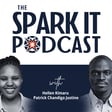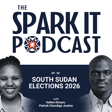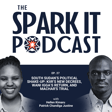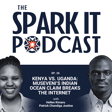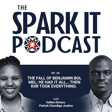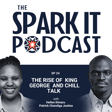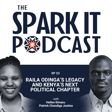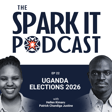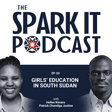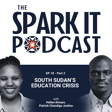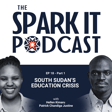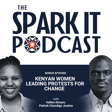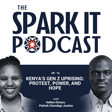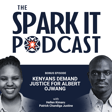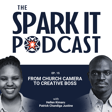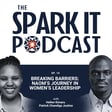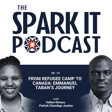Introduction to the Podcast
00:00:01
Patrick Abure
Welcome to the Spark It podcast, where we bring inspiring conversations that spark your interest to do more or keep the conversation going.
South Sudan's Path to Independence
00:00:08
Patrick Abure
Today, on the anniversary of South Sudan's independence, we reflect on a journey marked by struggle, resilience, and hope from decades of civil war and displacement to a hard-won vote for freedom in 2011.
00:00:21
Patrick Abure
South Sudan's history is one of resilience and strength. And joining us is Emmanuel Hidrat. Let's call him our in-house political analyst and our South Sudanese national who walks us through what independence meant and means, the human cost behind it, and the ongoing fight for peace and rebuilding.
Emmanuel Hidrat's Insights on Independence
00:00:38
Patrick Abure
He's also the host of Concerned Podcast, and please follow him on all social media platforms at the Concerned Podcast. Happy Independence Day to all our South Sudan fans from the Spark It Podcast.
00:00:51
Patrick Abure
Emmanuel, welcome to the Spark It Podcast once again. Thank you for making the time.
00:00:57
Emmanuel
Thank you, Kumaru. I'm happy to be here. the Spark It podcast and I'm excited that South Sudan is making 14 years old. Exciting one. Yeah.
00:01:08
Patrick Abure
I know that that's honestly exciting. South Sudan is one of the youngest nations and i would like us to, you know, i would like ah I would like for you to walk us through the journey ah to independence for South Sudan as, you know, from your point of view, especially because you are from South Sudan.
Historical Context of Sudan
00:01:28
Patrick Abure
I believe you have stories for days. And yeah, um so... would you probably just give us like a breakdown of what that looked like for South Sudan?
00:01:38
Patrick Abure
Maybe from um from the time before it actually broke into South Sudan, there was Sudan. And then there was the fight for freedom for South Sudan.
00:01:50
Patrick Abure
How did this journey look like for South Sudan before they even got their independence? Maybe give us like a little bit of a history lesson.
00:01:59
Emmanuel
Okay. um Yeah. thank Thanks so much, Kimaru, again, and all our viewers for this Packet podcast. ah Yeah. South Sudan is making 14 years old today.
00:02:12
Emmanuel
Gain our independence on 9th of July, 2011, through a hard-fought struggle. And the journey of South Sudan, I think, would best be dated back in ah the years of 1955.
00:02:29
Emmanuel
Even before that, in about 1899, that is when Sudan used to be one. That is the Republic of Sudan, which was put under ah the Anglo-Egyptian rule, which is also known as the Condominium Rule.
00:02:44
Emmanuel
So in 1899, that is when the Egyptians and the British established the Condominium Rule in Sudan, where they administered Sudan one country,
00:02:55
Emmanuel
However, ah Sudan was just administered as a one country, but in practice, ah the country was treated like it's two different countries because we had the northern part and then the southern part. The northern part was mainly ah predominantly Arabs and and and Muslims.
00:03:15
Emmanuel
Whereas in the southern part, we have some African ethnic groups and and mainly with some of them are Christians and others have their African traditions. They practice the African tradition.
00:03:27
Emmanuel
So when the Anglo-Egyptian rule was established in 1899, then after that, in about in about ah eighteen I mean, in about 1955, that is when the British decided that they now want to grant Sudan independent independence.
00:03:43
Emmanuel
And then the following year in 1956, that was when the British left and then they gave Sudan independence. And then ah in January, I think that's when Sudan gained independence.
00:03:57
Emmanuel
But as I say that the condominium rule, when it was established, it didn't actually administer Sudan in an equal way, in an equally fair manner, because there was even a kind of ah division within Sudan whereby the the Egyptians and the British, they treated the ps Sudanese people differently.
00:04:18
Emmanuel
The people in the north were given all privileges. They had all the infrastructures. They had the political power. And then the southern people, on the other hand, they were neglected most of the time, marginalized, no proper schools, no proper hospitals.
00:04:34
Emmanuel
And therefore that angered the people of of the southern part of Sudan.
Road to the 2011 Referendum
00:04:38
Emmanuel
That's why in 1955, even Sudan went into independence when the country were was already in in had like conflict within it itself.
00:04:47
Emmanuel
The southerners were not feeling that they their demands were had, their demands were actually given to them. So um that is when they went into civil war. The first civil war that happened was from nineteen ninety five from 1955 1972 when the Addis Ababa agreement was formed.
00:05:09
Emmanuel
And then after the Addis Ababa agreement ah was formed, Kalm returned a little bit. But ah just a few years later on, the country again went back to the second civil war, which is started in 1983.
00:05:22
Emmanuel
And this civil war was brought to an end through ah the 2005 Comprehensive Peace Agreement, which is also known as the Naivasa Accord that was signed in Kenya in 2005.
00:05:33
Emmanuel
And when the Naivasa Accord was signed, um it actually guaranteed that the southern part of Sudan would be run as an independent, as an autonomous state, and a province, an autonomous province. And also the Naivasa Accord gave ah the Sudanese, the southernan the Southern Sudanese people, the opportunity that after six years they will go for referendum that will determine their fate.
00:05:57
Emmanuel
That's why from 2005, after six years, that was in 2011, the country went for referendum in January. And that same year, when the referendum was conducted, the majority of South Sudanese decided that they want to be a country of
Leadership and Human Cost of Civil Wars
00:06:12
Emmanuel
Over 98% of the people of Southern Sudan voted for cessation. They voted for separation, where they separated from the northern part of Sudan. And that is when the country called South Sudan came into existence on the 9th of July 2011. So that is briefly the way...
00:06:31
Emmanuel
to ah the way of independence or the way to independence of South Sudan.
00:06:36
Patrick Abure
Wow, thank you thank you for that breakdown. For people who didn't know about South Sudan, I believe they have a little bit of lessons. So it looks like the comprehensive ah peace agreement that was signed here in Kenya, in Naivasha, as you mentioned, our was sort of like the biggest turning point ah for South Sudan because it kind of marked their road to independence.
00:06:59
Patrick Abure
at this point. ah Could you probably tell us ah a little bit about ah their role like John Garang before his death? What was the role that he played in all these?
00:07:14
Emmanuel
I think that is really one of the ah biggest contributors towards the independence of of South Sudan. Garang was a very ah very visionary leader.
00:07:26
Emmanuel
that He wasn't only so much ah looking at... He actually had a vision of having the United Sudan, but later on when um the Northerners were having...
00:07:39
Emmanuel
mistreating the Southerners. So my dad is when he had to decide and go for ah actually champion on the the separation of South Sudan. But the major role that Garang played was mainly during the Second Civil War that happened in 1983, which is also known as the Espelem War or the Anyanya II War.
00:07:59
Emmanuel
So in 1983, oh In 1972, when the Addis Ababa Agreement was signed, that brought an end to the first civil war.
00:08:12
Emmanuel
ah The leader of Sudan by then by by then called Nimeri, he actually broke the peace deal.
00:08:19
Emmanuel
He broke the peace deal, he imposed Syria law, where he declared Sudan to be like an Islamic state.
00:08:26
Emmanuel
And also he declared Arabic to be the official language of the country, yet the southern people were not familiar with that. um What Garang did was that he actually was the person who led the country through the second civil war.
00:08:42
Emmanuel
that of 1983 to 2005, he was the one who championed that war and he was really a very visionary leader that up to now, so many people still believe that it was through his efforts that the country actually got independent.
00:08:58
Emmanuel
So Garang labelled a lot, he labelled so much towards the the the independence of the country. he went and signed i mean He went and started the the the civil war that liberated the country from the north.
00:09:11
Emmanuel
And also one of the major contributions that he has done was, of course, the the CPA, the Comprehensive Peace Agreement. It was during that Comprehensive Peace Agreement that gave
00:09:20
Emmanuel
South Sudan a starting point to be an independent country and he contributed so much to what the peace agreement ah just after signing the peace agreement when he returned back a few months that is when he died unfortunately ah something that so many people didn't actually expect or didn't wish to happen and yeah that is mainly his contribution and he was the one behind ah the second civil war the Anyanya war the Esplemore that was in 1983 And that came to an end through the Comprehensive Peace Agreement or the Naivasa Accord of 2005.
00:09:55
Patrick Abure
Okay, yeah. And so after he dies, that's where we transition to President Salva Kiria.
00:10:02
Patrick Abure
ah Okay, before we even get to Salva Kiria, I hope I'm pronouncing his name right. ah So
Hope and Anticipation for Independence
00:10:10
Patrick Abure
ah you you did you did talk about like the the two civil wars that happened.
00:10:15
Patrick Abure
And i from my research and also what you're talking about, it looks like it lasted for way too long. Like it wasn't really, it was too long, honestly. And of course with such a thing comes, you know, like there is the cost of human life, the displacement and people becoming refugees.
00:10:36
Patrick Abure
Yeah. Could you probably tell us a little bit more? um how these um two civil wars have contributed to people are being, ah i would call it gen generations of marginalization and people ending up in camps and generally how this has affected people from the south.
00:10:58
Emmanuel
oh Yeah, just like any other civil war, of course, when when there is war in any place in the world, oh it actually is sparks in refugee crisis and it leads to loss of life, property and destruction of ah infrastructures.
00:11:13
Emmanuel
And ah the civil war in Sudan was was not exceptional.
00:11:17
Emmanuel
So when the war started, of course, so many people lost lives. And right away from the first one, that was when so many people went into refugee camps, some went to Uganda, some went to Kenya, others to Ethiopia.
00:11:31
Emmanuel
ah And yeah, some of our parents went during that time, they grew up in the refugee camp. And when the war stopped, that was when ah some of them came back home. But again, it didn't actually last. It didn't last for so long, again, when the other war started, the one that recently started. So from the first civil war that is started from 1955 1983, of course,
00:11:57
Emmanuel
it forced so many people to leave the country As I said, so many went and sought refuge in Kenya, in Uganda, and even some went as far as to some of the Western countries.
00:12:00
Patrick Abure
Uh-huh. Uh-huh. Uh-huh.
00:12:07
Emmanuel
They went there and ran into exile, and and some never went back to South Sudan. They actually lived here. yeah They born their children here. And yeah, and then the second civil war again, it it just like the first one, it also claimed so many lives.
00:12:22
Emmanuel
I guess like over 2 million people died, and out of millions of people again were... injured and displaced. So just like any other war that happens in the world, yeah, so many people lost their lives, others were displaced, forced to go and stay in countries that they were not born in and forced to live under and and um abnormal circumstances which they didn't expect in life.
00:12:52
Patrick Abure
And that's really, really sad because I do have friends who have told me about the experiences and also Patrick, the co-host at the Spark It podcast. ah he previously ah He previously talked about his experience also being born in a refugee camp and also his grandparents having to ah to have been refugees, his parents at some point.
00:13:12
Patrick Abure
So it kind of, it looks like for most South Sudanese nationals, It's like that has became like a cycle of events that keep repeating themselves.
00:13:23
Patrick Abure
And it's such a sad thing to have to go through. i would think of it like in the context of also creating generational traumas where yeah kids cannot stay grounded and then they grow up emotionally.
00:13:39
Patrick Abure
And maybe they are also their children have to go through the same thing. And that is the cost of war, which is particularly a very sad thing for people to have to to go through.
00:13:51
Patrick Abure
Interesting. ah So um you you talked about now South Sudan now getting their independence ah from the north. You are given a six years transition from 2005 so that you can get to to vote in a refer referendum.
00:14:09
Patrick Abure
ah to you know to probably either continue being part of the North or now become a fully fledged country. What did that look like ah for South Sudan ah nationals? Like in the context of, was there like anticipation for these?
00:14:25
Patrick Abure
Is this something that like they looked forward to? And could you probably just give us a rundown? And for you, for example, um did you get to witness this happen?
00:14:36
Patrick Abure
in real time, give us a rundown of how this looked like for people in South Sudan.
00:14:43
Emmanuel
Oh yeah, um I think ah when when when independence, i mean, when when the referendum was held, um I was a tender age.
00:14:51
Emmanuel
I wasn't so much into ah into politics and i was really not so much concerned about issues to do with South Sudan.
00:14:57
Patrick Abure
Mm-hmm. Mm-hmm.
00:15:00
Emmanuel
I was just that young. and But one moment that I i i i can recall is that um when the...
00:15:12
Emmanuel
I think it got me when I was, if I wasn't in Juba, was in EA. I can't remember exactly, but I remember that night when um when the results of the of the referendum were declared.
00:15:25
Emmanuel
And then ah they declared that ah ah the separation, all separation was ah the South Sudanese actually won, where they would become a country of their own.
00:15:38
Emmanuel
ah I remember that night, like majority of people in the place that I lived in, they marched on the street. They went to one of the biggest, it's called like Freedom's Choir.
00:15:49
Emmanuel
They were beating drums.
00:15:51
Emmanuel
They were dancing and making unilations. And everywhere, like you'd see that there was there was excitement in every person. And this was because...
00:16:01
Emmanuel
So many South Sudanese, they lived under terrible conditions. They lived under oh um marginalization. So many of them were marginalized during the era when they used to be a Sudan.
00:16:16
Emmanuel
So many of them couldn't have their demands, their voices heard. So they were hoping that by having a different country, by having a separate country of their own,
00:16:27
Emmanuel
all the challenges that they were facing when they used to be in Sudan would actually come to stand still.
Post-Independence Opportunities and Challenges
00:16:34
Emmanuel
And that was the hope that every single South Sudanese had in mind in 2011.
00:16:39
Emmanuel
There was so much excitement, there was so much enthusiasm. People were said people actually were setting tears of joy because they hoped that for the first time they would become fastest citizens in their own country.
00:16:50
Emmanuel
they'll be valued for those who have always spent their lifetime outside the country. They hope that they will come back home and actually settle and stay in their country where their parents and their ancestors were born.
00:17:03
Emmanuel
So that was the hope that every single South Sudanese had in their mind. And just from the declaration of the results,
00:17:09
Emmanuel
you could you you could just see the excitement in every person that time, marching on the street, dancing, singing songs of freedom. And people were shooting, like they were fired they were firing gunshots, not as a sign of of of of of maybe conflict or war, but that was like as a last bullet towards that that that would actually ah be fired in the country.
00:17:33
Emmanuel
So that was a symbolic sign, but unfortunately that did not lift
00:17:38
Emmanuel
for long, that again the country went back to civil war. But from 2011, people had the excitement in them. They hoped that for the first time they would be considered as first-class citizens, they would have a country of their own, that they would be the one to manage.
00:17:54
Emmanuel
Yeah, that was the excitement that people had.
00:17:57
Patrick Abure
Wow. that Yeah, that that I mean, that that must have felt really good after all these years of having to fight and getting displaced and not having sort of a voice.
00:18:08
Patrick Abure
It definitely marked a new beginning for for South Sudan and the people of South Sudan. And um you talked about like people, um you know, opportunities, their voices being heard.
00:18:22
Patrick Abure
ah Before the next, now, whatever, displacement or civil war happened, because there was a bit of... um I think people get got to enjoy at least two years or so of some peace and tranquility ah in South Sudan.
00:18:34
Emmanuel
but and so right Yeah,
00:18:37
Patrick Abure
Yeah, what what do you think were like the opportunities that opened up for people in South Sudan? Because I would say for Kenyans, there was a bit of mass exodus to South Sudan to set up businesses. Yeah.
00:18:50
Emmanuel
that's right. yeah you know i you know People always see opportunities in you know in this new country because this is a country that has just gotten its independence.
00:19:04
Emmanuel
and they lack so much in terms of human power, I mean, like human resource.
00:19:11
Emmanuel
So we do have like people from other countries that are kind of established, like Kenya, Uganda and the surrounding countries. so They were looking at so many opportunities in this new country and that's why so many of them came in because they knew this is a country that has just gained independence.
00:19:29
Emmanuel
Probably they won't have like that enough capacity to to do things by their own.
00:19:30
Patrick Abure
Mm-hmm. Mm-hmm.
00:19:36
Emmanuel
So so many Kenyans, so many Ugandans, Ethiopians, they came into this country to establish their own businesses but also to just support this country grow. So the country offered so many opportunities, not only to its citizens at this time, but also to people from the neighboring countries.
00:19:53
Emmanuel
And then um ah for the first time, people were seeing in in the first few years that from 2012, 2011, kids were going to school and the hospitals were getting built roads were constructed.
00:20:07
Emmanuel
And and ah was you could see that there was really hope in this country. So the opportunities that this country, i mean, people expected in this country were so much, where actually so many opportunities were on the way.
00:20:23
Emmanuel
But just as I said, that the the peace actually didn't live for long, and just in a period of about two years, that is when the country again went into civil war within itself, just after separation. And that makes people ask you so many questions.
00:20:39
Emmanuel
What was the problem?
00:20:39
Patrick Abure
Mm-hmm. Mm-hmm.
00:20:39
Emmanuel
The problem was not Sudan then, the problem was ourself. So because just in a period of less than three years, the country was again plunged into civil war, which was really, really unfortunate.
00:20:53
Emmanuel
But there were so many opportunities that the country offered, not only to its citizens, but even to people from the neighboring countries, just like you mentioned, Kenya, Uganda, Ethiopia. And even people from other countries and other Western countries, they saw opportunity in this country.
00:21:09
Emmanuel
They came in, they established, but so many of them again went back when the war broke up in 2013.
00:21:09
Patrick Abure
Mm-hmm. Mm-hmm.
00:21:16
Patrick Abure
Wow. I think ah from what you're talking about, I feel like a lot of African countries have gone through it. ah it's It's almost ah the same with when the British came and conquered and then they left.
00:21:29
Patrick Abure
Self-governance has always sort of had, especially during that transition period, I feel like most ah most countries went through that.
00:21:38
Patrick Abure
Like you feel like we are fighting for something. This is what you want or this is what we need. And then the moment is that transition. the people who are placed in power, sometimes either they, just something happens. And I feel like from the context of also South Sudan, it takes it takes for a selfless leadership to transition a country into sort of stability.
00:22:05
Patrick Abure
And I feel like for you ah in South Sudan, you didn't get to experience that for long. It was like two years later, again,
00:22:16
Patrick Abure
people are plunged into um a civil war. ah So ah for example, before we even continue now look ah to what happened now in 2013, what did independence mean maybe for exactly for like your family? What are those stories that maybe your parents or people in your family or your community talk about that sort of stand out for you and knowing now that they had already gone through this whole ideal of like, oh, they they don't have self-governance, they have been displaced for the longest, they have been ah fighting for you know for their own independence.
00:22:56
Patrick Abure
What's the like that one thing that stands out that maybe somebody has told you or you know about?
00:23:02
Emmanuel
You know, um oh one thing that when I want to say about is that, um as I said when Sudan used to be one, um the southern part of Sudan was was really um was not so much valued.
00:23:19
Emmanuel
And in times of ah of education, as I say, ah the people from the southern parts didn't get the opportunity to go to school and get to learn so much, even about the importance of having a sovereign country like South Sudan.
00:23:35
Emmanuel
So to so many of our parents who just witnessed the challenges of being in the Sudan, when they were told that ah ah they are going to separate from Sudan.
00:23:48
Emmanuel
all day how All they had in their mind is that once they have a country of their own, all the challenges that they were going through, things to do with marginalization, things to with forced labor, these things were happening.
00:24:03
Emmanuel
Things to do with like, you're forced to to to to participate in a religion or denomination that is not yours, to speak in language that is not yours.
00:24:12
Emmanuel
they had in mind that from the time when South Sudan would be a country of its own, all the things that were happening in the dense Sudan would stop.
00:24:20
Emmanuel
So that was what was in their mind. But also there was a hope in our parents that when they actually get a country of their own, this is going to be the last time that they will hear sounds of gunshots and all the things that they used to hear. That will be the last time that they will go and again settle in ah the country I mean, in the neighboring country, but they would stay in their own country.
Analysis of the 2013 Conflict
00:24:41
Emmanuel
so These were things that were in the mind of our parents.
00:24:45
Emmanuel
They were expecting their kids to go to school and attain a education zone and and change their lives in in future.
00:24:45
Patrick Abure
Mm-hmm. Mm-hmm.
00:24:51
Emmanuel
They were expecting to go to hospitals that are built within the South. They were expecting to travel in roads that are decent. So that was mainly what was in the mind of of of of of our parents by that time.
00:25:05
Emmanuel
Though they didn't go to school,
00:25:07
Emmanuel
But just the challenges that they were going through in the post-South Sudan or during the war actually just gave them a very brief oh summary of what a new South Sudan would be for them.
00:25:23
Emmanuel
So it's meant that the challenges that they went through actually made them think that when they have a separate country of their own, all the challenges that they went through would be history.
00:25:36
Emmanuel
So that was mainly what was in the mind of our parents. But to me as as as as an individual, I later got to learn that when I learned about ah the history of my country because I i was introduced to the history of South Sudan when I was in in about Form 2.
00:25:50
Patrick Abure
Mm-hmm. Mm-hmm.
00:25:54
Emmanuel
That was when I started learning about the history of South Sudan. So interesting. And I really have learned that ah Our founding fathers, people like like Dr. John Garang, the Marbio who died, they really had a vision for the country.
00:26:10
Emmanuel
They had a vision, a very big vision for the country. And i I have a feeling that if he didn't die that early, the story of South Sudan would be totally different.
00:26:21
Emmanuel
the story of South Sudan would be totally different and that even within just this shortest time period from 2011, South Sudan would have been in a very, very good position by now.
00:26:32
Emmanuel
So ah our independent was, I would say, it was really hijacked by the dead of Dr.
00:26:38
Emmanuel
John Garan, very passionate guy.
00:26:40
Emmanuel
He was so much in love with the people of South Sudan and he was just a very good leader. So many people praise him. And when you go across the country, He is one of the the founding fathers of the country and he's spoken so much about about being ah the founding father of South Sudan.
00:27:00
Emmanuel
So yeah, independence meant a lot to so many South Sudanese, but just like, as I say,
00:27:07
Emmanuel
it It didn't work the way people thought, like people expected. Things changed just within a very short time, in a periodo ah in a period of less than ah three years.
00:27:17
Emmanuel
Things changed completely and people got back to where they were. So, unfortunately, yeah.
00:27:23
Patrick Abure
Wow. I can imagine the excitement during the independence and people. ah And I believe there was ah also a mass exodus of people from camps, like going back to ah South Sudan, because, i mean, we've gotten our freedom, we've regained our country back, we can go and start rebuilding.
00:27:42
Patrick Abure
So I imagine you have already started rebuilding, and then two or three years into it, you have to go back to scratch. ah Could you take us through
00:27:53
Patrick Abure
that particular moment in 2013, for somebody who might not know, what really happened in 2013 that probably took ah you know the country back into chaos?
00:28:08
Emmanuel
um As I said, would say the the issue that started in 2013, I would say it wouldn't have happened if Dr. John Garang was still alive.
00:28:20
Emmanuel
But what happened in 2013 was mainly a result of lack of trust that happened during the liberation. Because um when the country got the independence in 2011, actually before the country went into independence in 2010,
00:28:34
Patrick Abure
Mm-hmm. Mm-hmm. Mm-hmm.
00:28:39
Emmanuel
The country, the whole of Sudan, the southern part of Sudan as an autonomous state went for election. There was an election that was held in 2010. And during that election, the current president, Sal Fakir Mayadeh, was elected as the president and ah Dr Machar as his vice president.
00:28:56
Emmanuel
And these were actually the they leaders that took the country into independence in 2011. Just in 2010, we went for the election and in the following year, the country went into referendum.
00:29:05
Patrick Abure
Mm-hmm. Mm-hmm. Mm-hmm.
00:29:09
Emmanuel
So um when Cahill was elected as the president, he formed his cabinet just like any other president would do. And then Machar was his vice. So unfortunately, I think there was some kind of leaked information where the president leaked that the vice president, Dr. Machar, together with some cabinet, top ranking cabinet officials, ministers and some army generals, they actually plotting a coup against him.
00:29:33
Emmanuel
They wanted to overthrow him.
00:29:34
Patrick Abure
boom Oh well.
00:29:35
Emmanuel
So what he did was that he had to make counter-respond. Before that happened, what he did was that he sacked the whole cabinet. He sacked his vice president, he removed his vice president Machar, he removed the ministers and all other ah suspected ah army officials that were suspected to be the one plotting the coup.
00:29:57
Emmanuel
So that incident alone, that 2013
00:30:03
Emmanuel
government, RSAFO, changed the whole story of the country. So after a few months, after the sacking, the Vice President Machar, of course, he defected.
00:30:13
Emmanuel
He went into the bush. He defected and then he went and came back again and attacked the the president. He came and attacked the forces of the president. And that is where the civil war started from 2013.
00:30:25
Emmanuel
It was just because The vice president who felt that he had labelled so much towards the independence of the country, that he had he had he fought so much to liberate the country from oppression, was not entitled to be the vice president of South Sudan.
00:30:41
Emmanuel
So that was where the the problem started from.
00:30:44
Emmanuel
that That perception on that since fought in the struggle, he's entitled to be the vice president of South Sudan, That was the whole thing that started the fight in 2013.
00:30:57
Emmanuel
And from there, we went in 2014, the fighting continued. Some kind of agreement was reached, but it didn't last for long. Again, in 2016, the country went back into war.
00:31:09
Patrick Abure
Mm-hmm. Mm-hmm.
00:31:10
Emmanuel
And finally, in 2018, again, they had to go to Addis Ababa and attain what we called the the revitalized agreement on the resolution of the conflict in South Sudan. They signed that agreement that again brought back the Vice President Machar as the Vice President and other Deputy Vice President. So, yeah, the problem that the country is grappling with right now started in 2013.
00:31:34
Emmanuel
ah That was when the president sacked his vice president and then some cabinet and also members of the army. So from there, they defected and they came and attacked the forces loyal to the president.
00:31:45
Emmanuel
And that's where the fighting escalated, escalated to most parts of the country in 2016. And so many people were killed, others displaced, others internally, and others to the neighboring countries.
00:31:57
Emmanuel
That's where the problem started.
00:31:59
Patrick Abure
Wow, that's a really sad thing. um Okay, so this ah this particular conflict between the president and the vice president at the time is definitely what caused this now civil war post-independence.
00:32:14
Patrick Abure
ah Do you think in your own opinion
00:32:17
Patrick Abure
now since especially 2011 to right now in 2025. of Whatever has been happening in South Sudan, the displacement and all that, apart from that particular conflict, is it does it continue to be fueled by ethnicity or it's just the rift between the two?
00:32:37
Emmanuel
like I said, people just like as i say that um
00:32:44
Emmanuel
ah what what is happening in the country can be dated back to during the war.
00:32:50
Emmanuel
um During the war in 1991, just like in Kenya, in South Sudan we do have like so many tribes.
00:33:00
Emmanuel
We have 64 tribes in the country.
00:33:04
Emmanuel
and The majority, ah the the major tribes in the country are the Nwales and the Dinkas. ah
00:33:13
Emmanuel
The president of the country happens to come from the Denka tribe.
00:33:17
Emmanuel
The vice president happens to come from the newer tribe. And historically, there was an incident in 1991 that happened whereby it was claimed, I'm not giving it as my opinion, but that's what I read in history,
00:33:33
Emmanuel
in the history about my country that um the Vice President, Dr. Machar, had actually participated in what we call like a massacre of some thinkers. That was in 1991. And I think right from that time, and also there were some claims that Machar at some point wanted to betray the struggle. He was so much allied to the people in the north.
00:33:55
Emmanuel
And there there left some kind of distrust.
00:33:56
Emmanuel
So so many people, Kale and others, were not even trusting him. So um when the vice president was sacked in 2013, at some point because he felt that the the president is from Dinka, so I think there was that feeling that maybe ah it was Dinka against the Nueres because the vice president happens to come from Nuer and the president from Dinka.
00:34:13
Patrick Abure
Mm-hmm. Mm-hmm.
00:34:20
Emmanuel
So people could just have that conclusion that it's it's like a kind of ethnic fight. and five But I think that also, that belief had to spread among even members of these communities.
00:34:31
Emmanuel
And they had to live with that belief that this is a reality, that it is not even a fight between maybe like power, but it is an ethnic tribe. So, and this perception led into targeted clink. Even in 2013, there was a genocide, some kind of genocide, but like a mass murder of people from a specific tribe in 2013, from the Nuer tribe that happened in the country.
00:34:55
Emmanuel
in 2013 in the country. So whereas I won't say so much that it was an ethnic conflict in the country, but people who had that in mind.
00:35:07
Emmanuel
People believe that it was, it and that is mainly defined because ah the president happens to come from the Dinka and the vice president happens to come from the New Wales.
00:35:15
Emmanuel
So many people think it was Dinka-New Wales kind of conflict. ah But yes, where that might be also a factor that contributed, but there were so many factors that contributed to it.
00:35:26
Emmanuel
so So many other factors. But yes, um I wouldn't conclude that the the fight that happened in 2013, it was an ethnic kind of war.
00:35:34
Emmanuel
Because even the other tribes among the 64 that actually participated in it, other tribes were...
00:35:42
Emmanuel
ah um at the side of the vice president and others at the side of the president. So, yeah, and that that would make that makes me to have a conclusion that it wasn't so much an ethnic kind of confrontation, but though it contributed, because it wasn't purely the Dinkas and the New World fighting, but...
00:36:01
Emmanuel
it Even the Dinkas had people from other tribes. The Dinkas had Nuer on the other side and Nuer had Dinkas from that side.
00:36:08
Emmanuel
So it was a kind of just political kind of fight, fighting because of ideological differences, but also because the vice president felt that he was removed from the position where he's supposed to to be serving in.
00:36:23
Patrick Abure
Wow, that's that's an interesting take. Okay, so um post that war, how does peace look like ah for the average person in South south Sudan?
00:36:39
Patrick Abure
Would do you say like right now living in Juba feels safe, for example, are living in South Sudan?
00:36:50
Emmanuel
that that that That depends on what you call safety or what do you define safety.
00:36:57
Emmanuel
Because one, yes, if if I, if one would say, of course, Dubai safe right now because there are thousands of people living in Dubai and they are surviving. They go to sleep, they wake up good, they go to their work, they come back home, they eat, they sleep.
00:37:12
Emmanuel
So um one would say that
00:37:15
Emmanuel
oh there is safety, a kind of safety in Juba. But ah to someone who looks so deeper into um and the word safety, including other aspects, then I would say there's there's no so much safety in Juba because if for me, the word safety it to me doesn't only mean like maybe leaving home, coming back home safe and staying, but it includes safety.
00:37:43
Emmanuel
going out there and just going out saying what I what i want, what my mind tells me, is sharing my ideas,
00:37:49
Patrick Abure
Mm-hmm. Mm-hmm.
00:37:51
Emmanuel
My opinions and and I feel that there's nothing that's going to happen to me when I go on the street. ah The government try to do something and I have my opinion about it, maybe in a written form, posted on social media freely or through an opinion on newspaper or go on national TV and speak about it on the radio, speak about it. I come home and sleep. Well, there's nothing that happens to me.
00:38:15
Emmanuel
If that is what we call safety, then I feel there is no safety in Juba. But if it means going out and just sleep, come and eat, go out, yes, there is safety. But it depends on what you define safety.
00:38:28
Emmanuel
So to me, um when we are talking about just having the, how do I call it, the ordinary life, yes, there is safety to some extent.
00:38:39
Emmanuel
But going into it deeply, you know, it's life life is not that so much secure yet in the country.
00:38:46
Emmanuel
Even people don't know what tomorrow holds like. They will still go, but they, you know, they they really don't know what what's what's going to happen tomorrow. So peace is just very thin back home. That's what I would say.
00:39:02
Patrick Abure
Wow. So you would actually agree that there are some certain levels of freedoms that people still don't experience at this point?
00:39:12
Emmanuel
Oh, yeah, of course. um Yes, but but but yeah, just like in in so many countries, you know, ah people always have, like governments have, far they just have their fears.
00:39:25
Emmanuel
And, know, and I really don't mind i don't want to ah maybe put so much blame on the government because apparently that's, that guys there's a stage where every country has to go through.
00:39:41
Emmanuel
When a country has just been independent, you know it will take so many years for a country to attain its full democracy democratic principle, if you want to be a democracy, you know for a country to reach an extent where they care less about what people post against, people in power go and speak against people.
00:39:50
Patrick Abure
Yeah. Mm-hmm.
00:40:01
Emmanuel
and It takes so many years. It doesn't just come like just like in a very short time. It doesn't. So what what what is happening back home today, where, as would say, maybe the government doesn't avail all kind of liberties to its people, but that is just a stage of a grunt of every country.
00:40:19
Emmanuel
So it happens like that.
00:40:20
Emmanuel
Even these countries that today we see as the murders of democracy around the world, at some point they went through that stage where ah they just don't want to someone to go out there and speak anything recklessly about them.
00:40:33
Emmanuel
no So, yeah, this the country is just in a stage of growth. That's what I would say. And with time, we'll have all the liberties that people want. Obviously, that is when we have... ah ah a new crop of people who know what it means to just give someone freedom to go and express themselves, speak their mind out there. You know, when we have people, like-minded people who believe that ah someone who comes out and criticizes my actions is not actually my enemy, but is just sharing his opinions on how things are supposed to be run, then that's when I would say we we have like a dream country.
00:41:14
Emmanuel
yeah But as at this extent, I don't want to put blame so much on the government that they are not availing all liberties to its citizens.
00:41:21
Emmanuel
But as as I say, it's just a state of growth of any state.
00:41:25
Emmanuel
So with time, we will get there. Yeah.
00:41:29
Patrick Abure
yeah I like the fact that you admit that to get there, it's sort of like a journey because I feel like after all the conflict and all that, it means at some point there's even some levels of distrust and to have autonomy of opinion would, as you've said, it would definitely ah take time.
The Role of Diaspora and Youth in South Sudan
00:41:49
Patrick Abure
for you not to get to a place where you are judged because you said something that sounds like not everybody agrees with it. And I mean, that can really be backed up by what people have already been through.
00:42:01
Patrick Abure
You see so much throughout your lifetime that sometimes it informs people how you do things, how you say things, and ah things like that. um as a South Sudanese national who is in the diaspora right now, what would you say, for example, how has the conflict in South Sudan over the years, for example, shaped the identity of people living in the diaspora?
00:42:27
Emmanuel
um You know, majority, I would say, not even in the diaspora, but back home.
00:42:34
Patrick Abure
Mm-hmm. Mm-hmm.
00:42:35
Emmanuel
I mean, in every, maybe you um in every 10 South Sudanese that you meet on the street, just not even in South Sudanese, when you go on the streets of Nairobi, and just ah maybe in every 10 South Sudanese that you get at least nine of them.
00:42:56
Emmanuel
will identify as refugees. Nine of them might identify as refugees. And yes, um and I know so many people attribute their country to being a war-torn country where it's it's known for for for for conflict. that That's what so many people know what South Sudan for. And it's not even surprising that there are so many people who actually don't know that they there exists a country called South Sudan.
00:43:23
Emmanuel
It's funny, it's very funny that so many people don't know that there's a country called South Sudan because it just gained independence. You know, people would know that is's a country called Sudan. When you say Sudan, some people have knowledge about it, but South Sudan, less people do have knowledge about it.
00:43:38
Emmanuel
But yes, um staying outside South Sudan, obviously, um you know, it won't just... ah make someone maybe less identify as South Sudan, I mean, as South Sudanese, of course, i I might be a Canadian right now, but I fully understand where my roots are, right?
00:44:01
Emmanuel
So I know where I was born many of the years I lived back home in my own country, and therefore, it will be a betrayal for me to identify as a Canadian and not as a South Sudanese at some point. Yes, I would identify as a Canadian, but in because I lived majority of my years, many of my years I lived back home.
00:44:21
Emmanuel
So yeah, I identify as South Sudan. But also I just want people to know that South Sudan is not just identified by by conflict.
00:44:32
Emmanuel
There are so many people who are passionate about about building a country that that respects the rule of law, a country that trails on peace, a country that everyone wants to live in.
00:44:44
Emmanuel
So, whereas so many people might know South Sudan for being a country that has always been in war for many years,
00:44:51
Emmanuel
They should also know that, you know just like in any country, there are people who are passionate about building the country. So we do have young people right now, and I'm seeing it happening all over. I can see it on social media, people who are not so much attached to um to the conservative way of how ah they are supposed to behave. you know People, those who grew up during the war, they always have a mentality of solving every problem through through conflict, which is not the way.
00:45:14
Patrick Abure
Mm-hmm. Mm-hmm.
00:45:25
Emmanuel
I mean, there's so many ways where we could resolve problems when it happens. And I'm seeing that there's so many young people right now who are passionate about that, who actually have shown that when there is a problem, they can rather...
00:45:38
Emmanuel
to to solve it in a better way. They don't, in most cases, identify themselves based on ethnic lines.
00:45:45
Emmanuel
Yes, it is good to identify yourself, ah based on your ethnic group, that is your pride. you should be proud of where you come from. But that shouldn't be a basis of of of of of of your life in the country.
00:45:58
Emmanuel
You shouldn't be living on the basis of ethnicity, right?
00:45:59
Patrick Abure
Yeah. Mm-hmm.
00:46:01
Emmanuel
You should just recognize that, yes, I am from this tribe, but that shouldn't really impact the way how you relate with other people. So important.
00:46:10
Emmanuel
What is important is that you put the country first, put on some other things that can take the country ahead. Ethnicity is just one strength that the country will have. It means that we have a diversity of people. And when we have a diversity of people in the country, we have people, we have different cultures. When we have different cultures, we have people behaving in different ways and they have new and different ideas. And all this can contribute to what building a country.
00:46:37
Emmanuel
That is one thing that people should identify.
00:46:37
Patrick Abure
Mm-hmm. Mm-hmm.
00:46:39
Emmanuel
ah i mean, they should know about ethnicity.
00:46:42
Emmanuel
It doesn't really have to be a factor that takes us back as as as the case. It is back home and in other countries. Yeah.
00:46:51
Patrick Abure
Wow, interesting. I want to give you a break. You've really talked. So I'll give people a general facts or historical facts about South Sudan.
00:47:03
Patrick Abure
So South Sudan is one of the youngest nations and it gained its independence in July ninth in 2011. So the independence vote i was conducted and over 98% of South Sudanese voted for independence in a referendum. They really wanted to break ah from the north and you know, have autonomy over their own country and grow and rebuild.
00:47:33
Patrick Abure
And it also became the 55th African country and the 193rd member of the United Nations. And its capital city is Juba.
00:47:45
Patrick Abure
And yeah, it's one of the fastest growing cities in Africa after independence.
00:47:50
Emmanuel
And it has 10 states.
00:47:54
Patrick Abure
Oh yeah, it has 10 states.
00:47:55
Emmanuel
Yeah, just like Kenya house forty seven count so has South Sudan has like 10 states and three administrative areas.
00:47:59
Patrick Abure
Counties, oh wow. Uh-huh.
00:48:08
Patrick Abure
Oh, wow. Yes. And also it has like one of some of the tallest people in the world.
00:48:14
Emmanuel
Tallest. We are ranked the best in basketball, actually.
00:48:15
Patrick Abure
They get drafted in the NBA.
Education and Storytelling's Role in National Identity
00:48:18
Patrick Abure
Yeah, I know they get drafted in the NBA. Like who was the recent draft? um I've forgotten his name.
00:48:23
Emmanuel
I think it's called, this guy called Malwaj. It's called Malwaj, some 19 year old guy, like that boy, I think, yeah.
00:48:27
Patrick Abure
Yes. Yeah, yeah.
00:48:32
Patrick Abure
Oh, yeah, he was trending just recently. And, yeah, so Sudan has ah really beautiful people. They are thriving in modeling, you know. They are the epitome of blackest beauty.
00:48:45
Patrick Abure
Yeah, so those are, like, some really good and fun facts about ah South Sudan. So, yes, I believe you've had a sip of water. Now we can continue.
00:48:58
Patrick Abure
Oh, wow, oh, wow.
00:48:58
Emmanuel
I've gained some energy.
00:49:01
Patrick Abure
I think it was really needed. You've already told us a lot about South Sudan and thank you for educating our viewers and ah listeners. ah What do you think ah is South Sudan's place in the African Union and the global community, especially since after it gained its independence?
00:49:23
Emmanuel
um You know, um,
00:49:26
Emmanuel
i would say for a country to be so much recognized on the international space, it has to have people contributing on the international stage.
00:49:44
Emmanuel
and Just like, let's look at Kenya, for instance. I won't take you far, but let's look at Kenya. Like, Kenya is so much known right now because Kenya has, like, so many people contributing on international stage.
00:50:01
Emmanuel
We have, like, very prominent journalists, like... like in all this international like mainstream media, we have we have Kenyans who are serving as CEOs in so big, like mal mal I mean, how do you call it, multi-world world companies.
00:50:18
Emmanuel
We do have them, there are so many.
00:50:20
Emmanuel
so ah Right now, if I'm to rate this, I mean, South Stand position on the international stage is that it's it's not so much, um ah it doesn't really have so much impact because um just like as I said, that we had like a very, very um low literacy rate and that because of ah the legacy of ah of of colonialization that happened where there was not really like some base, I mean, emphasis put on educating South Sudanese.
00:50:52
Emmanuel
And for that reason, even after independence, there are not so many people who are educated produce who contribute so much on international stage. So the country right now really doesn't have so much impact because it has less people contributing on international stage.
00:51:08
Emmanuel
If we had that, you know these people, when they go outside there, they will be recognized or noticed based on the country that they come from.
00:51:18
Emmanuel
And when they do when they contribute positively, it it gives like ah the pride the pridede goes back to the country where they come from.
00:51:26
Emmanuel
And that's where the countries easily get noticed.
00:51:28
Emmanuel
I'll give you an example. like There's one kenyon prominent Kenyan journalist who works with CNN, Larry. no larry like
00:51:36
Emmanuel
Larry, it's doing great. And even there's one ah also called, what is his name? He used to work for Citizen TV. He's called, ah I forgot his name, Waihega, Maura, right?
00:51:50
Emmanuel
That's some kind of that, yeah. but But these guys, they're really doing great. They're doing, even in... in in in like in marathon, they're doing great, like doing a very, very, very great thing.
00:51:59
Patrick Abure
Mm-hmm. Mm-hmm.
00:52:02
Emmanuel
So I feel for a country to have an influence, to have an impact on international state, it has to produce people who have the capacity to go and serve on this international state.
00:52:14
Emmanuel
When South Sudan reached an extent where maybe the next chairperson of the African Union happens to come from South Sudan, when it reached an extent where the next chairperson of the that maybe they the the they the assembly, the General Assembly happens to come from South Sudan, or the one that leads one of the UN bodies comes from South Sudan, know, this country becomes easily noticeable to people.
00:52:36
Emmanuel
But until we send people of this caliber to go and serve in the international state,
00:52:44
Emmanuel
we have no influence on the and and international state, I would say. So, yes, but i said i as I said, there is so much for South Sudan.
00:52:53
Emmanuel
There are really so many people out there who are on the right path. They're pursuing education. And and South Sudanese are some of the bright people in the continent. That's what I would say.
00:53:04
Emmanuel
They are very bright people.
00:53:06
Emmanuel
And I just have a hope that one day the citizens from this country will actually have that capacity to go and serve in these international stages and they can also take the name of the country.
00:53:18
Emmanuel
right But at this point, there's not so much influence from South Sudan.
00:53:23
Emmanuel
Even within the regions, there's not so much influence because um you know we We don't really produce people who are capable. I'm not saying that there are no people who are capable.
00:53:33
Emmanuel
We do have people who are capable, but they are not given the opportunity to actually showcase their ability to serve in this. So it also depends on what government is there to give platform to these people to come out so that they can easily be noticed by the world out there.
00:53:51
Emmanuel
you know yeah But at this time, there's not so much influence.
00:53:56
Patrick Abure
Makes sense. Honestly, I wouldn't blame ah people from South Sudan because as you said, you were already at some point like marginalized. There was ah no access to education, no access to these opportunities. So it will definitely take time.
00:54:13
Patrick Abure
But I feel like um the next generation leaders are the young people of South Sudan. There is hope. And I feel like people like you Patrick and all these young people who are doing amazing things on the ground. ah you're already setting stage.
00:54:31
Patrick Abure
You're setting a stage for what your futures ah would look like as ah as people from ah South Sudan. And change, in as much as change takes time, you will definitely get there. And speaking of young people, i in my network, have a I have a ah couple of people I know ah from South Sudan who are doing amazing things, ah whether it's in the refugee camps in the country.
00:54:59
Patrick Abure
I feel like with young people, there is a hope of sort of rebuilding because of the way they are not afraid of taking risks, whether it's from an education point of view, like for you, for example, you you took that risk. You talked about your journey ah from you know from war to Canada and all that, the way you've taken the steps to get an education that will definitely change your life and that of your community.
00:55:26
Patrick Abure
Other people are starting businesses, other people are starting non-governmental organizations and also helping like ah people who still live at their camps.
00:55:37
Patrick Abure
For example, Patrick also talked about his journey starting SESI and the impact it has had and what he's doing ah for young people.
00:55:46
Patrick Abure
i feel like It might take time, but already for you guys, you've especially the young people of South Sudan, you've already set something in motion and you might not feel the exact impact immediately, but 10 years from now, the stage has been set. 10 years from now, you will be talking about a totally different outlook for South Sudan, in ah whether it's in... um in a community setting or in a global in a global stage will have more representation. So I think for me, I would say it's just for you guys to you know to keep going.
00:56:27
Patrick Abure
That's what it takes to have that hope and to rebuild and to keep looking for these opportunities and to educate the people and your communities. Wow, that's important.
00:56:38
Patrick Abure
So ah um I feel like a lot of times when we talk about countries or maybe communities, it's very easy. And I feel like the other day was on TikTok, I came across this video.
00:56:51
Patrick Abure
Somebody was trying to dissect the history of Kenya. And I feel like ah even our own history books, most of them were not necessarily ah written by us.
00:57:02
Patrick Abure
the people of Kenya, for example, they have like more about a bit of colonial influence. What do you think is the importance of the people of South Sudan telling their own stories in their own voices and in their own points of view?
00:57:18
Patrick Abure
How does that shape what the future looks like for people from South Sudan?
00:57:25
Emmanuel
um I think ah it's it's not even about the story of South Sudan, but I feel it's it's important to have a curricula in general that actually serve the interests of the country.
00:57:42
Emmanuel
Like, come I feel we should have a curricula that focuses so much on our history and, you know,
00:57:55
Emmanuel
history of a country is very, very important. If we have it written in a way that is so biased, it's going to impact the generation for eternity.
00:58:07
Emmanuel
you know And especially when we do have countries that
00:58:11
Emmanuel
are multi, like multi-ethnic countries. Like for instance, we do have countries like Kenya, we have countries, South Sudan, majority of so africa's country African countries, they have like so many ethnic groups.
00:58:26
Emmanuel
So if we have a history of a country, with so many ethnic groups written in a most biased way that actually, um that tells or that try to diminish the rest of the other communities or ethnic communities you feel that this will go down into history and the generations that will come will keep on learning this history and this history will keep on creating bigger problem in this country. So I feel like it is good, especially when you realize that you have a diverse country, it is good to actually write a history that respects diversity, you know, that respects the diversity of country.
00:59:08
Emmanuel
It is good to have an education system or a curricula that actually can train people on how to solve a problem within their own country. You know, it's it's good to do that.
00:59:18
Emmanuel
You shouldn't just um ah be focusing so much on history that is written by so by other people, by colonialists, because I feel like theial the were so much biased in so many ways.
00:59:33
Emmanuel
So the history that they wrote, ah it was biased and therefore the best way that we can do is that we need to rewrite our history and it should be rewritten in a way that values the existence of every ethnic group, that values the contributions that these communities or these ethnic groups have actually met throughout history.
01:00:00
Emmanuel
And when we do that, you know people get People get to learn about it. The generations that come after they get to know that, okay, um this ethnic this ethnic group is not ah less important.
01:00:11
Emmanuel
They equally contributed towards...
01:00:14
Emmanuel
the progress of this country, they equally contributed towards the liberation of this country.
01:00:15
Patrick Abure
Yeah. Mm-hmm.
01:00:20
Emmanuel
But if we have a history that is so biased, which actually gives so much credit to a particular ethnic group, neglecting the rest. So the people that will come after us will keep on learning that history and that will actually deepen uh uh ethnic problems within the country which is so bad so it is time it is high time we we we have to i mean we ah rewrite our history in a way that is so balanced and unbiased you know that is a very very important thing and and i feel that the history of south sudan honestly needs to be rewritten
01:00:53
Patrick Abure
Mm-hmm. Mm-hmm.
01:01:00
Emmanuel
needs we need needs We need to really look into it so deeply so that the people that will come after us will know that the country that is existing today, it is as a result of every contribution that each and every member of community
01:01:19
Emmanuel
actually participated in. But if we have a history that is so biased, then we'll never have a country that will value all ethnic groups. That is very important. And it's not about history only. Talking about the whole curricula or the whole education system.
01:01:35
Emmanuel
There's need for the education system to be revamped so that
01:01:39
Emmanuel
It gives value to the country. It creates people who are thinkers, people who are innovators, people who are peace builders, people who can go and and and just like solve problems in a most amicable way that does not result into creating more conflict.
01:01:58
Emmanuel
I feel that that is that is the way that ah the education system or the history needs to be ah reformed. Right.
01:02:08
Patrick Abure
Now that reminds me ah that in another episode you talked about the education system in South Sudan and Uganda.
01:02:16
Emmanuel
andda Actually, maybe a disclaimer, I know I went through that video and lot of comments, so many people were saying um um that the education system of Uganda is more ah better than...
01:02:17
Patrick Abure
You were trending on our TikTok.
01:02:31
Emmanuel
Yes, of course, I clearly understand that. I clearly...
01:02:34
Emmanuel
But I was... I was comparing that the two education systems in the context, I mean, with with the Canadian system or with the education system that i'm in right now.
01:02:42
Patrick Abure
yeah mm-hmm mm-hmm
01:02:44
Emmanuel
um Of course, um in Uganda, Uganda is a kind of like somewhere ahead of South Sudan in terms of it. That's why we do have so many South Sudanese going to study in Uganda, but we have sometimes no Ugandan is going to study in South Sudan, it's because the education system of Uganda is way better than the one of South Sudan, but still it's not the best, right?
01:03:06
Emmanuel
It's it's and not the best.
01:03:06
Patrick Abure
Mm-hmm, mm-hmm. Yeah.
01:03:08
Emmanuel
So it really doesn't focus on on on creating the people who can solve the problem that the countries are dealing with. And that's the basis on which I was giving that.
01:03:17
Patrick Abure
Mm-hmm, mm-hmm.
01:03:20
Emmanuel
Keeps on only training people on passing examination and that was all. Yeah.
01:03:24
Patrick Abure
Mm-hmm, mm-hmm. Going back to that issue of ah creating a curriculum and also the whole storytelling about communities being involved, would like probably to challenge you and other young people from South Sudan to take up that um And especially um because I feel like we live in a bit of a totally different time where we can document our own stories.
01:03:49
Patrick Abure
So maybe it's time for young people to take up that space and document as much as possible because I believe you you want this to be something that your children, yeah you know your grandchildren could look back and they'll be like, yeah, at least our stories or the story of our country was told in a lens that reflects ah what we stand for or what is true and what factual.
01:04:16
Patrick Abure
Yeah, but definitely when it comes to education,
01:04:19
Patrick Abure
um let's I think with every country, the most basic things are usually like education, health, and having like a proper infrastructure.
01:04:30
Patrick Abure
Do you think at the moment South Sudan is making ah any progress, ah especially with the three countries?
01:04:37
Emmanuel
um I think you know i wouldn't have i would have given the best answer if i if I'm ah right now back home because um what I see on social media might not be like um like what I would say ah the definite
01:04:58
Emmanuel
ah definition i mean of what is in existence that is on ground.
01:05:00
Patrick Abure
A true reflection.
01:05:03
Emmanuel
Because that i the last time I was in South Sudan in 2016.
01:05:03
Patrick Abure
wow. Mm-hmm. Mm-hmm.
01:05:09
Emmanuel
So nearly 10 years now. so
01:05:14
Emmanuel
and and And I feel that yeah there could be some kind of a lot of ah maybe new infrastructures being built and and and health health facilities, but also education.
01:05:28
Emmanuel
But yes, from stories that I read on social media and news and all these, it looks like, you know, we still grapple so much with our education system and that it's not fixed.
01:05:39
Emmanuel
Sometimes it takes months even to mark like to come up with with with with the results of the national examinations and then it comes like two months, three months late.
01:05:52
Emmanuel
And you know it's just done so that. So that tells us how weak the system is sometimes. So um I think there's really so much that needs to be done, even like in all sectors regarding education, health and infrastructure
Misconceptions and Resilience
01:06:07
Emmanuel
I think there's so much that needs to be done in the country. and then But also, a country can't just develop develop like its own infrastructure by itself.
01:06:18
Emmanuel
And this needs like investors to come into the country. And the only way for investors to come in when they are rested, sure that when they come and invest their businesses, there is hope that there is no destruction going to happen. And that calls for peace.
01:06:32
Emmanuel
you know When there is peace in a country, it attracts investors to come in this very country. So I think there are priorities that the South Sudan government needs to put in its preference list, in its top list, and one of it is peace. When there is peace, it opens ways for so many things.
01:06:48
Emmanuel
We'll have investors, you know, some of the health facilities that are built in countries are not even built by the government. We do have some private health sectors that are built by these big ah private individuals. So, and you know, there's no one who wants to build those big buildings for health.
01:06:48
Patrick Abure
That's true.
01:07:04
Emmanuel
ah when they know there is no hope for peace in this country.
01:07:07
Emmanuel
So they can only do that when the government assures them that there's not going to be any war anymore.
01:07:12
Emmanuel
So I think the earlier the government do that, the better for the country. So the government needs to focus so much on restoration of peace in the country, and that will open ways for so many things, including infrastructures, development, and also ah development in the health sector, but also in education.
01:07:33
Patrick Abure
Yeah, so I think what you're saying is peace will become the firm foundation that South Sudan can grow on and it will be important going forward.
01:07:44
Patrick Abure
That's that's that's good.
01:07:46
Patrick Abure
That's really good. ah What are the misconceptions you think people have about your country?
01:07:53
Emmanuel
Misconceptions about South Sudan is that ah they are they are very rich.
01:08:02
Patrick Abure
I swear it's true. Are you rich? Because even here in Kenya, when you I have seen people come.
01:08:09
Emmanuel
my sister My sister lives in Nairobi, as I said.
01:08:14
Emmanuel
um And there's always these ah kind of thing when they go, I think recently they moved to a new building and the way how they were charged was different from how other people were charged.
01:08:26
Emmanuel
That's one. And my friend always always tells me like, she has like some Kenyan friends who sometimes ask, hey, are you rich?
01:08:26
Patrick Abure
that's true
01:08:33
Emmanuel
And she doesn't even have like a bob in her pocket. and She doesn't have that. Well, she got it. Like she doesn't have the money. And that even happens this and when I was in Uganda, you know,
01:08:44
Emmanuel
when we go to the market and when, in most cases, you know, it's easy for these Ugandans to notice that you're South Sudanese. And, you know, from the look, most of us are too tall, you know, when they are tall and dark skin and also they speak, like when they speak in English, you know, they'll easily notice that this is how Sudanese.
01:08:52
Patrick Abure
Mm-hmm. Yeah.
01:08:57
Patrick Abure
You stand out.
01:09:04
Emmanuel
And you find that and they will charge you like for, you know, like the little things that buy so much. that From experience, i was I was in Uganda in in December last year.
01:09:18
Emmanuel
So I went in December.
01:09:19
Patrick Abure
who Mm-hmm.
01:09:22
Emmanuel
I was buying some little item, just like, what was that? I think it was a gift bag, like a gift bag. So apparently I heard someone that gift bag was supposed to be for 7,000 ceilings, okay?
01:09:35
Patrick Abure
Mm-hmm. who
01:09:37
Emmanuel
the guy saw me, and then he he was speaking to me in Luganda, but I couldn't speak. And then was like, because I don't know Luganda, I just speak in English. And I was like, where are you from? And he like, I'm from South Sudan.
01:09:48
Emmanuel
I didn't know that that was a trick he was going to use to charge me.
01:09:52
Emmanuel
So he asked me that because I told him South Sudanese. So, you know, the guy gave me that back at a double price. was saying like 14,000.
01:10:00
Emmanuel
tin And because i I didn't know the actual price for those things in Kampala, so i had to pay for it. But when I came home, a friend of mine told me that ah that bag is sold at $6,000. You could even buy it at $6,000 or $5,000.
01:10:12
Emmanuel
I was like, this guy.
01:10:15
Emmanuel
Yeah, so people have that misconception that South Sudanese are very rich.
01:10:20
Emmanuel
They like spending money anyhow. And and that that might happen.
01:10:24
Emmanuel
You know, I'm told like in Nairobi, you'd see some of the the best cars are driving by South Sudanese. They have SSD number plates on the streets of Nairobi, Kampala.
01:10:35
Emmanuel
you know You know, it's not that we are rich.
01:10:37
Emmanuel
We are not rich. We are just extravagant. That's what I would say. Yeah.
01:10:44
Patrick Abure
In Kenya, I would say the lure in you. You know, even lures in Kenya associate are associated with being like really posh. They spend spend.
01:10:52
Emmanuel
yeah right Yeah, I think we're just extravagant.
01:10:56
Patrick Abure
and ah interesting.
01:10:58
Emmanuel
Yeah, that's true.
01:11:00
Patrick Abure
But that ah that thing about rent, it's true. In Kenya, that you would be charged more if you are South Sudanese.
01:11:05
Emmanuel
Yeah. some of them eat. All right.
01:11:08
Patrick Abure
Wow. Wow, wow, wow.
01:11:10
Patrick Abure
Okay. Okay.
01:11:10
Emmanuel
this so some of them it right
01:11:15
Patrick Abure
wow So what would you like ah the rest of Africa and the world to understand better about South Sudan?
01:11:22
Emmanuel
um I think we're just a young country. And just like ah any of your, I mean, most of the African countries started there.
01:11:32
Emmanuel
ah You know, when we get back into the road to independence, they went through all the stages that South Sudan went through.
01:11:42
Emmanuel
you know, ah even in in in in Kenya, I guess, like, immediately after independence, ah was it in 1962, 1963? I think ah
01:11:53
Patrick Abure
Yeah, 63. Mm-hmm. Mm-hmm.
01:11:53
Emmanuel
but in 1963, you'd see that immediately after the independence, the country was still struggling with some few things, right? There were few things that the country was struggling and That was the same case with Uganda, with
01:12:07
Emmanuel
all the other African countries. So the state that South Sudan is in right now is not just like a bad state, but that is a state that all the other African countries went through.
01:12:17
Emmanuel
So we'll ultimately get to a state where we'll be in line with most of the other countries.
01:12:23
Emmanuel
So it's just a matter of time.
01:12:25
Emmanuel
so But the state that we're in, it is a part of... of development of any country that you will have to go through that state, figure out the the problem with that but that situation and have to change things, flip things around and get the better way.
01:12:41
Emmanuel
But um yeah, we are not just known for conflict. We have some of the the peace-loving people in the country, and yeah, very good people, and yeah, yeah you know, very resilient, and and and they just they they're just good people.
01:12:58
Emmanuel
And many of you attribute South Sudan for being like, arrogant, you know.
01:13:03
Emmanuel
Yeah, there some of us are very arrogant, and just like in any country, so many other people are arrogant as well.
01:13:09
Emmanuel
So, these are just a few, yeah. ah These are some of the things that I need people to know about South Sudan. yeah
01:13:16
Patrick Abure
Okay. Interesting. Interesting. So as we wind up the episode, what gives you the most hope for South Sudan's future?
01:13:24
Emmanuel
ah The most thing that gives me hope is ah the young people, the young people of South Sudan.
01:13:30
Patrick Abure
Mm-hmm. Mm-hmm. Mm-hmm.
01:13:32
Emmanuel
you know um They are like doing things in a different way. um you know Right now, ah this state of mind, I do have friends almost from all the tribes in South Sudan, nearly all the tribes in South Sudan.
01:13:52
Emmanuel
And from my interaction with them, the way how they the they actually um look at things gives me hope that ah very soon we'll have a generation of South Sudanese who will actually ah one, the better for their own country.
01:14:12
Emmanuel
They wouldn't be driving so much on tribalism, on on conflict, but they always do the best for their country.
01:14:19
Emmanuel
So when I see people, like in my cycle, when I see my friends, when I see... The South Sudanese who go to school, who are so much passionate about pursuing their studies and doing some of the best programs out there, it just gives me hope that one day we will have a country where the young people will be the custodian of of of of their future.
01:14:40
Emmanuel
They will be the one and and they will redefine ah everything about the country. And and that hopes and that that hope is everywhere.
01:14:51
Emmanuel
I see it on on social media. I see it on ah through my friend. I see it just, it's written everywhere. We have people in that kind, mean of that kind. So that is my only hope.
01:15:03
Emmanuel
My only hope is in the young people of South Sudan, who I have a very strong belief that are going to change everything about the country.
Reflection and Future Hopes for South Sudan
01:15:13
Patrick Abure
Well, yes, the future is in the young people. You're parting short?
01:15:19
Emmanuel
oh I think i I would be so mean if I would not wish happy independent independence anniversary to my fellow countrymen. I mean, my fellow South Sudanese.
01:15:31
Emmanuel
We are 14 years old. Very exciting. This is a journey. But I feel that the most important thing about these days is that we should just reflect on the ah The reason why we sought for independence, why we fought for independence, we fought for independence so that will be a sovereign country.
01:15:47
Emmanuel
We will be the one running our own affairs. will be the one solving our own issues in case we have problems. We wouldn't go back to war. We'll send our kids back to school. Our kids will grow at home.
01:15:59
Emmanuel
They wouldn't go to their neighboring countries or grow in refugee camps. These were some of the reasons why those who liberated this country pick up arms and went and fought against the oppressors.
01:16:14
Emmanuel
So I think when we see these things happening today, even when we are already an independent state, I think we should ask ourselves so many questions. How far have we moved away from the objective of the struggle.
01:16:28
Emmanuel
So it these these are some of it is a moment to reflect on it. It shouldn't just be a moment of celebration, but it should be a moment of reflection.
01:16:37
Emmanuel
And we should reflect so much on why our founding fathers pick up arms and win and fought against the oppressors. When we know about it, I think we can readjust ourselves and get back to on track.
01:16:51
Patrick Abure
Wow. Honestly, I don't have anything else to add.
01:16:54
Patrick Abure
You have ended this episode ah very well. ah Thank you, Emmanuel, for lending your voice on the South Sudan issue as a South Sudanese yourself.
01:17:06
Patrick Abure
It's been truly amazing to hear from your point of view what um the road to independence has looked like for you know an average South Sudan person the people of South Sudan in general.
01:17:18
Patrick Abure
And and I think, as you said, it's important to reflect on the why you fought for independence and where you are at and what you want the yeah the future to look like for you know the future generations.
01:17:34
Patrick Abure
So as also for me, I would like to say happy independence anniversary to South Sudanese nationals and all our supporters.
01:17:43
Patrick Abure
And as we mark South Sudan's independence, let's remember that freedom isn't just about a flag. It's about dignity, identity, and the right to rebuild.
01:17:54
Patrick Abure
Today, we honor the pain, the power, and the promise of South Sudan's people. ah Thank you for tuning in to the Spark It podcast. I've been your host, Helen Kimaru, joined by...
01:18:07
Patrick Abure
Emmanuel Taban of the Concerned Podcast. Please follow him on all social media platforms. And also ah let's keep the conversation going on our social media platforms. Leave us a comment on our socials let us know what you actually know about South Sudan.
01:18:24
Patrick Abure
And also as ah as a South Sudanese national, what standouts for your country and what would you want your country to look like in now and in the future?
01:18:35
Patrick Abure
Thank you for tuning in and it's been amazing. Until the next one. bye

